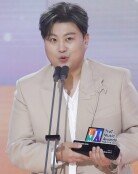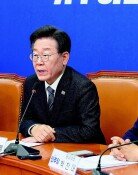Ex-lawmaker fights to correct marathoner Sohn`s nationality
Ex-lawmaker fights to correct marathoner Sohn`s nationality
Posted March. 03, 2011 10:29,
At midnight on Aug. 15, 1970, Korean lawmaker Park Young-rok went inside Berlins Olympic Stadium with his wife.
He climbed up a ladder on the wall of the memorial tower of the 1936 Berlin Summer Olympics, took out tools he brought from Korea, and corrected the nationality of marathon gold medalist Sohn Kee-chung from Japan to Korea. He needed five hours to complete the task.
Not a single stadium worker recognized Park since he worked meticulously. The stadium discovered this later and reported the lawmaker to police, who sought to arrest the Korean for trespassing and damage of public property.
Park, however, had left. German authorities then changed back Sohns nationality to Japan.
I took everything from chisel to hammer. When I arrived at the stadium, the memorial tower was higher than I thought so I bought a ladder there. I started working from midnight and finished at dawn, he said.
His forehead was sweating as he recalled the situation. Though nearing age 90, he remembered that day clearly.
Forty-one years have passed since that day but little has changed. So Park says he remains committed to correcting Sohns nationality even after the runner passed away in 2002.
Born in Goseong County, Gangwon Province, Park as a child possessed a strong national spirit. On how he got to know Sohn, he said, I studied at a seodang (private village schools providing an elementary education in the Goryeo and Joseon dynasties of Korea) to be a true Korean. I couldve had a decent job had I gone to a Japanese school. I enjoyed the marathon and saw the annihilation of the Japanese flag by The Dong-A Ilbo. I was interested in embedding the spirit of Korea in the hearts of the Korean people.
Soon after starting his political career, he went to an overseas training program in the 1960s on the invitation of the U.S. secretary of state. There he found that Sohn was described as Japanese at the memorial tower in Berlin and grew determined to correct it.
When I arrived at Gimpo Airport (in Seoul), Sohn was there to greet me. He said he was born to his parents but that my wife and I made him reborn as a Korean, Park said.
Sohns nationality was changed back to Japan, however, because the Korean government and ruling party at the time were uncooperative in helping Park since he was an opposition party member. I was on the blacklist and was treated like a criminal even when Japan said they would help if Korea wanted, Park said.
The official Web site of the Beijing 2008 Summer Olympics described Sohn as Japanese, fueling controversy. The International Olympic Committee homepage also lists the gold medalist as Japanese national Kitei Son.
I will hold a national convention on the recovery of Sohns nationality and send a delegation to IOC headquarters in Lausanne, Switzerland. Korean sports officials should actively take interest in this issue, Park said.
Given that Pyeongchang County in Gangwon Province is aggressively working to host the 2018 Winter Olympics and talking with the IOC, I will think of concrete action plans.
On Parks actions, a Korea Olympic Committee official said, This isnt an easy matter because we must consider other countries that were once colonies. We will try to have Sohn not described as Japanese.
Bae Jong-shin, former vice minister of culture, sports and tourism and now secretary-general of the organizing committee for the 2014 Incheon Asian Games, said, This is something that has to be done but itll be a difficult job. Well first try to reach a consensus with Japan and then demand a correction to the IOC.
kjs0123@donga.com







